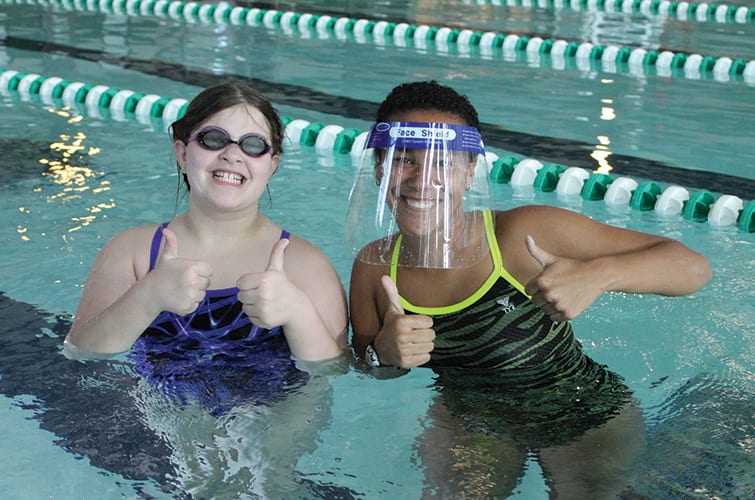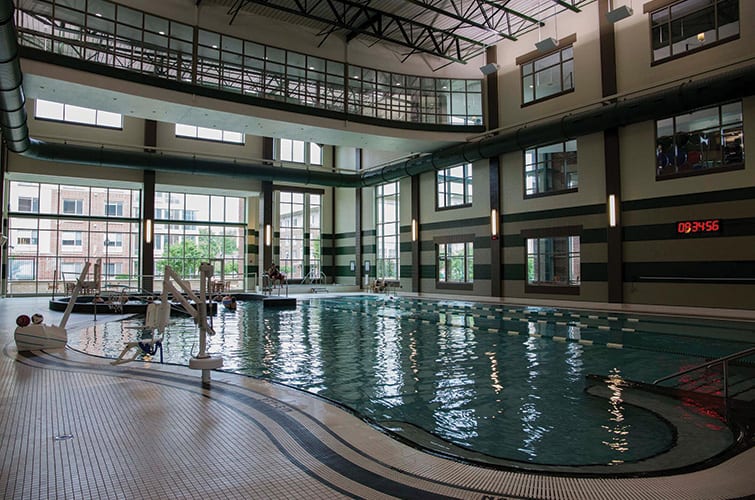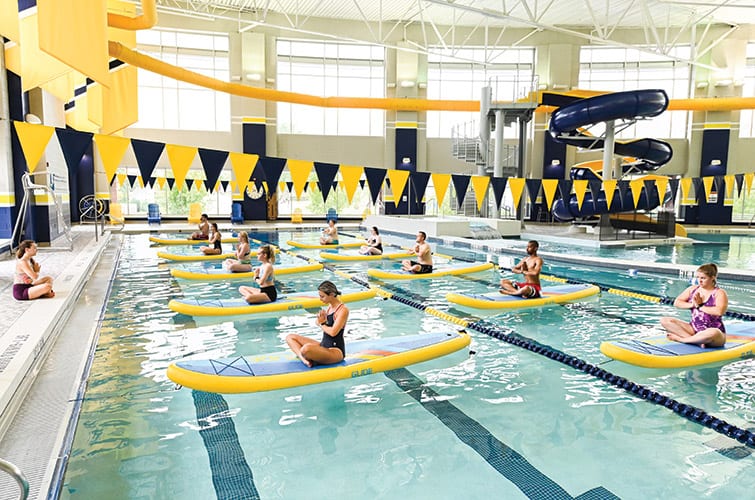One area of campus recreation programming hit hardest by the pandemic was aquatics, causing many schools to come up with creative ways to still offer the programs their communities were asking for.
The Changing Landscape
For example, Craig Gosnell, the assistant director of Programs and Engagement at the University of Tennessee at Chattanooga (UTC), said he couldn’t express enough how important it is to seek input from students. For example, students at UTC led to the launching of three successful, new programming opportunities they were able to offer during the pandemic.
- Swim the Tennessee River: While this concept is not exactly new, Gosnell said his team felt it was the perfect time to break out a classic program with a special twist. “The Tennessee River is 652 miles in length,” said Gosnell. “This program challenges participants to individually see how far they can swim, while also working as a team to see if our combined lap swimming community can reach the goal of 652 miles. The challenge closed at the end of the fall semester and we honored our top three swimmers with a towel, swim cap and swim bag.”
- H2Yoga: Stand up paddle board yoga was new to UTC in the Fall 2020 semester. It was such a hit with students that they were tweeting about it on social media. “This socially distanced program was created and implemented as a collaboration between Campus Recreation Aquatics, Fitness and Outdoor Adventures,” said Gosnell. “Each session of H2Yoga has been full and we plan to continue this program.”
- Friday Night Log Rolling: Because this program continues to be enjoyed by students, Gosnell said it was a must to offer during a time with limited options. To help create a fun atmosphere, staff frequently play music during the sessions and have observed a group of regulars who now make this program a routine.
Similarly, aquatics programming also looks much different than it has in the past at Marshall University. Eric Becker, the coordinator of Aquatics and Safety, said basic lap swimming is their most popular pool program since being able to reopen last June.

Through implementing a reservation process managed with CSI Spectrum, patrons are able to reserve a lane for a specific time of day without fear of showing up and finding no lanes available. This software manages many in-house functions through the features Scheduler — for patron reservations — and Event Manager — for department and external reservations such as birthday parties.
“Even with precautions taken due to COVID-19, our swim lesson participation is a fraction of what we see during a normal year,” said Becker. “A change we have made is pushing our private swim lessons more than group swim lessons to try to meet the community safety concerns.”
You Need to Evaluate Your Aquatics Programming
While many changes have already taken place, it’s never too late to consider evaluating the programs you currently offer and see where you may have room to add. Becker said his first step when considering new programming is to figure out if it fits with the program area by asking the following questions:
- Does it make sense to add it to the current landscape of programming?
- Will the current population utilize or participate in the program?
“Usually, I do not add programs just for the sake of adding, and they must come with the proper intention in place,” said Becker. “Pool layout and size does play a role in what programming can be done successfully as well.”

At UTC, Gosnell shared he learned how crucial it is to have buy-in from three key groups prior to launching new aquatics programming or an event: student employees, various stakeholders and your target population.
“While you may personally consider a new program to be a brilliant idea, if you do not have the interest and support from the program’s targeted population, the program will inevitably fail,” said Gosnell. “Hard data through quantitative assessment methods can certainly help you gain an understanding of people’s interest, however, simply engaging in casual conversations with people can be just as effective.”
Factors to Consider in Evaluation
Part of the program evaluation process also consists of deciding whether to continue a program or not based on a variety of factors. At Marshall, evaluation comes down to the cost of running the program versus the amount of participation.
“Continuously running a program no one shows up for will eat away at the budget through staffing costs,” said Becker. “Programs over on expenses and not bringing in any revenue will most likely be discontinued. In terms of modifying, we have the ability to sit down as a programming team to decide on any changes to make to improve the product we are offering.”
Aside from cost, UTC evaluates programs based on the motto, “Enriching Life Through Play.” When reviewing a program’s success, Gosnell said the first thing he thinks about is impact by asking if the program made a positive impact on the lives of those who participated.
“While we certainly need to be fiscally responsible in our programming, and large attendance numbers make a bold statement, assessment of these types of numbers does not speak to the impact a program has on its participants,” said Gosnell. “I am far more interested in open-ended questions and discussions.”

What’s Next?
Looking ahead, Gosnell predicts many participants will soon be eager to get back to in-person programming. His team plans to continue offering adult swim clinics, private swimming lessons, H2Yoga, community swim challenges, lap swimming and open play.
Similarly, Becker said his prediction for the most popular programs in the next year will be aqua fitness classes such as Aqua Splash, Aqua Zumba and GlideFit.
“These classes tend to have smaller sizes and cater to our community population,” he said. “My other prediction is group swim lessons will continue to struggle until next year when COVID-19 restrictions may be lifted or eased.”
Images courtesy of UTC and Marshall University.










